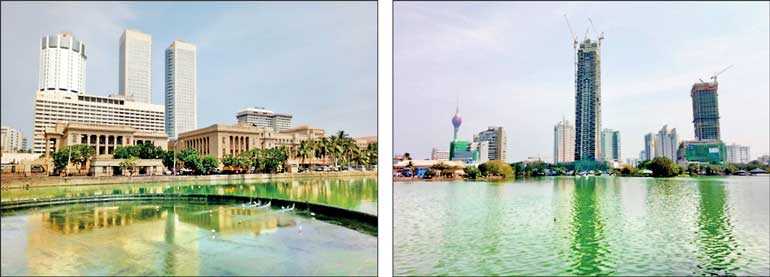Monday Feb 23, 2026
Monday Feb 23, 2026
Tuesday, 7 May 2019 00:00 - - {{hitsCtrl.values.hits}}

By Srimal Fernando and Kirtan Bhana
Sri Lankans are more resolute than ever to continue building a peaceful nation. They are all too aware that the cowardly suicide bomb attackers have no ideology and are carried out by a faithless few. They have belief that their over 300,000 strong tri-forces have the knowhow, support and will to extinguish any threat and bring about normality once again.
The past decade has been a boon for this teardrop-shaped island nation lapped by the waters of the Indian Ocean. Millions of people who have travelled to the country since it has found peace with itself, to encounter its abundant natural beauty, describe it as a paradise. They are sharing their experiences with others advising them to place Sri Lanka on their bucket list of places to visit.
As Sri Lankans mourn the victims of the dastardly attacks, many children among the dead, they also have to come to terms that the perpetrators of the sickening act were Sri Lankans. They coordinated a series of suicide bomb attacks that targeted Christian churches and five-star hotels across Sri Lanka. Perpetrated on Easter Sunday, 21 April, indicates that the deadly acts were timed to inflict maximum casualties, shock and awe.
The senseless assault was unexpected. In the decade that followed the end of the 30-year civil conflict, Sri Lankans were enjoying the benefits of the peace dividend. Efforts for reconciliation and rebuilding a unified country were proving successful. It is a progressive society with human rights at the core of its constitutional democracy. The vibrant and dynamic political landscape is open to debate and discourse.
New laws were passed to create a free and just dispensation which spurred the growth and development of the country. Trade, tourism and investment levels increased exponentially. Colombo, Sri Lanka’s capital city, has developed into a modern-day metropolis. State-of-the-art skyscrapers and property developments glisten in the backdrop of a tropical horizon.
Sri Lanka’s location in proximity to India and China, two of the largest economies in the world, the nations of ASEAN, Africa and the Middle East makes it attractive for trade and investment. It is positioned in the heart of the busiest shipping lanes in the world.
Tourism is up 5% (Gross Domestic Product, GDP) and growing. The tropical island with its coconut palm tree lined and pristine white sandy beaches is the ideal getaway for some rest and recreation. The over 1,000km coastline also offers opportunities for adventure sport enthusiasts. Scuba diving, surfing, kayaking, kite boarding among other activities are available to get the adrenaline pumping.
Ceylon Tea is Sri Lanka’s world-renowned commodity. The many tea estates in the cooler hill stations inland provide informative tours of the meticulous production of tea. Some also provide accommodation among the manicured plantations and unique tea spa health and beauty treatments. Its cuisine is a culinary expression of its tropical vegetation and the bounty of the majestic ocean that surrounds it.
Sri Lanka’s ancient history goes back many thousands of years. Its many temples and historic sites are linked to the epic story of the Ramayana and Buddha, enchanted by gods and demons and the triumph of good over evil. Its recent history of ousting the oppressive colonialist and building a modern independent state is testament to the determination and resilience of its people. The solidarity and support expressed by the international community once again places the spotlight on the ordinary innocent people of the planet. The overwhelming majority who wake up every morning to put in an honest day’s work with reasonable expectations of decent accommodation, good food on the table, sensible education, affordable healthcare and a holiday getaway every now and then.
People travel; they move everyday crossing streets, neighbourhoods, cities, continents and even oceans. Be it just going to work, visiting friends and family, professionally for business or sport, recreation or leisure, people travel and always will. Research shows that people will easily spend time and money on an enriching experiences and exploring new destinations, learning new languages, indulging in exotic food and encountering unique cultures and traditions.
Even the trauma and humiliation caused by airport security and Customs checks has not deterred travellers, in fact more people are travelling more and more. The innovation in communication and technology has made travel accessible. Travellers are better informed; the online booking marketing and promotion systems have created a platform to make excursions affordable or bespoke and sophisticated as is desired.
The Sri Lankan authorities are hard at work to stabilise the situation in the country and bring about order and routine once again. Special concessions are being made to restore calm and confidence in the tourism sector.
Emergency laws will grant security officials extra powers to seek out, investigate and extinguish any credible threat. Assurances are being made that measures being put in place will effectively and efficiently bring the situation under control in a relatively short period of time. Remaining vigilant will remain a challenge without infringing on human rights or hampering economic development.
The natural feeling of sadness of the memories of lost loved ones will always remain as the effects of the shock and bewilderment wane, but will never be completely forgotten. Sri Lankans will have to keep their anger in check and move beyond the circumstances that seem so unfair.
[Srimal Fernando is a Doctoral Fellow at Jindal School of International Affairs (JSIA), India and a Global editor of Diplomatic Society for South Africa. He won the 2018/2019 Best Journalist of the year award in South Africa andr Kirtan Bhana in the Founding Editor and Travel Envoy for the Diplomatic Society of South Africa.]